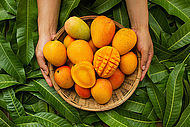
Process and Product Development for Tropical Food and Nutritional Safety
TropiFONS specialization
Presentation
The Food Science and Engineering Department of ESIROI offers an engineering programme accredited by the French Engineering Degree Committee (Commission des Titres d’Ingénieurs). This programme provides training focused on the drive associated with the development of agrifood and innovation in a sustainable context. The Department has the key infrastructure along with the major equipment necessary to conduct research and projects in these areas.One of the major challenges we face as a global society is to ensure the quality and security of food products and ingredients. This is especially true in tropical and sub-tropical regions where food production and availability is a sensitive factor, given that these regions can be characterised by insularity, climate change, population growth, specific health issues, the vulnerability of resources and processing units. Students can choose to concentrate on the tropical context throughout the TropiFONS specialisation in Reunion island, specifically designed to promote a gateway to the Indian Ocean. You will be trained to optimise the transformation of food products in a tropical region while participating in nutrition safety. The TropiFONS specialisation (equivalent to a Master 2) is based on a project-learning mode. You will investigate the scientific aspects of food security, nutrition, safety, and the wider implications of diet on wellbeing. Emphasis will be placed on the use of local resources, constraints related to the supply chain, food safety, nutritional and sensory aspects, sustainability and the environmental impact, as well as regulatory and cultural contexts.
Why is this course for me?
This programme is designed to address the challenging problems in the domain of food science. You will implement your food science, engineering and problem-solving proficiency by bringing together the knowledge and skills acquired throughout this course. Becoming part of this professional skills-based programme will allow you to become acquainted with the value of local resources and specific high-value products. As a consequence, this will improve your career prospects while shaping a unique study profile in the Indian Ocean and in a tropical environment. Our strong links to local industry and to the Indian Ocean agrifood network will allow you to remain in constant contact with local professors, guest lecturers from research institutes and food companies or government authorities involved in the teaching programme
Programme description
The TropiFONS programme has been designed to combine the basic sciences with specialised courses that are directly related to problem-solving situations. The students will complete a succession of group projects under the guidance of a staff member or an external supervisor and submit a detailed deliverable to the Department. The project will take different forms:A literature review that will critically evaluate and summarise the current stage of development as well as suggesting approaches to resolving issues associated with the topic : • Project organization, setting up an action plan;• Laboratory work involving an analysis of data, pointing to a current research problem in food science;• Food product development;• Effective communication and presentation.The outcome will be in the form of deliverables such as a food product or a processing plan or unit, taking either any kind of raw material available or any food process into consideration, with a strong component of innovative eco-design and eco-responsibility, adapted to the local context.
COURSE CONTENT AND ORGANIZATION
The semester is organized into 19 weeks. It starts with a teaser project, which is followed by six projects (P1 to P6), each one aiming to consolidate a specific area of expertise, plus a final open project related to previous skill acquisition. (P7). The model-week organization is based on 32 hours of activities, including courses, coaching, practical work, visits and seminars. The students will work in groups of 5 to 6. Gradually the students will be encouraged to gain more autonomy by deepening their skills. The method is based on a learning contract which allows both the students and teachers to follow the acquisition of skills over the semester. This will be implemented through self-assessment and peer-assessment and the teacher will periodically review skill acquisition with the student
Admission requirements
Applications from students involved in French Engineering Schools (CTI) is encouraged, together with applications from French and foreign universities, for a semester or one-year exchange.The TropiFONS Degree is equivalent to a Master 2. Applicants must have a background in Food Science and Technology, given that this is a multi-disciplinary field involving Chemistry, Biochemistry, Nutrition, Microbiology, Food safety and Engineering. Even though knowledge of the English language in a professional context is one of the objectives of the course, students may need to demonstrate an adequate level of proficiency in English to attend lectures and seminars. Local and international students who do not meet the English language requirements for this programme may be able to follow a parallel English course, to achieve a better command of English language skills.